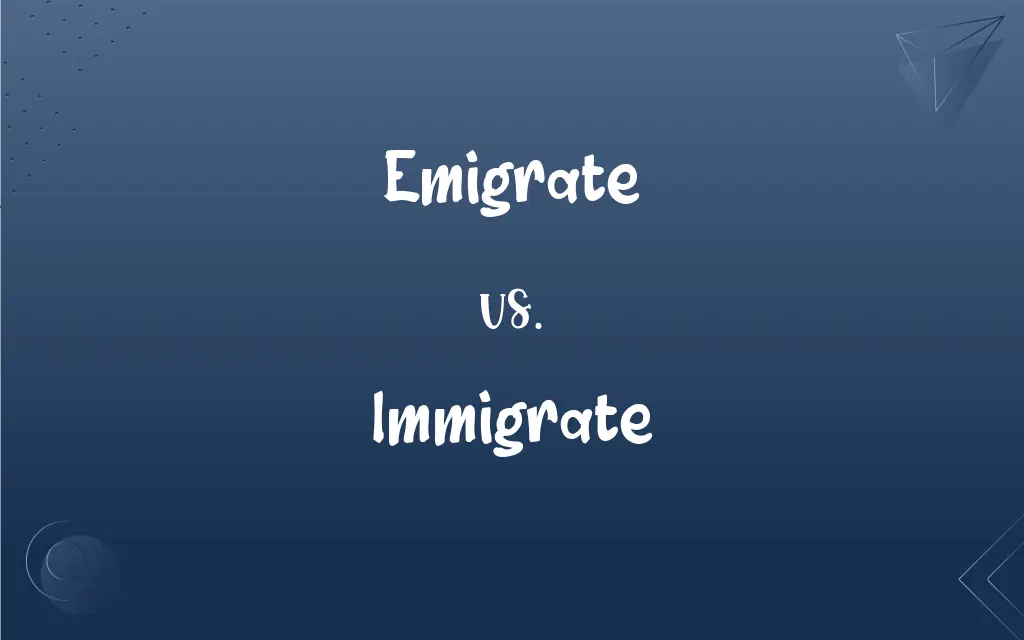Emigrate vs. Immigrate: What's the Difference?
Edited by Aimie Carlson || By Harlon Moss || Updated on October 26, 2023
Emigrate means to leave one's country to live in another; immigrate means to come into another country to live.

Key Differences
Emigrate refers to the act of departing from a particular country or place with the intent to reside elsewhere, while immigrate signifies the act of arriving and settling in a new country or place. Both terms center around movement but from different perspectives.
When individuals emigrate, they're essentially exiting their homeland. They're taking a step to disconnect and relocate. On the other hand, when individuals immigrate, they're integrating into a new environment, suggesting a sense of inclusion in a foreign land.
Emigrate gives the sensation of letting go, departing, and maybe even a sense of loss from the perspective of the originating country. In contrast, immigrate involves acceptance, new beginnings, and the establishment of a new chapter in the destination country.
To understand the subtle nuances between emigrate and immigrate, consider the direction. Emigrating is about moving out, whereas immigrating is about moving in.
Think of emigrate as an "exit" and immigrate as an "entrance". Both actions complete the journey of an individual from one country to another, but they emphasize different parts of that journey.
ADVERTISEMENT
Comparison Chart
Direction
Moving out from a country.
Moving into a new country.
Focus
On the country being left.
On the country being entered.
Grammar
Used with "from" (emigrated from India).
Used with "to" (immigrated to Canada).
Perspective
From the point of view of the departure place.
From the point of view of the arrival place.
Related Word
Emigrant – a person who emigrates.
Immigrant – a person who immigrates.
ADVERTISEMENT
Emigrate and Immigrate Definitions
Emigrate
To relocate for economic, political, or social reasons.
Scientists often emigrate for better research opportunities.
Immigrate
To move into a region as a new inhabitant.
Birds immigrate to warmer regions during winter.
Emigrate
To exit a region as part of a population movement.
During the famine, thousands emigrated to avoid starvation.
Immigrate
To enter and settle in a country that's not one's native land.
After marrying, he chose to immigrate to his spouse's homeland.
Emigrate
To leave one's native country to settle in another.
Many chose to emigrate in search of a better life.
Immigrate
To transition into a new country or society.
Refugees often immigrate due to dire circumstances in their homeland.
Emigrate
To depart from a place, especially one's homeland.
They decided to emigrate after economic downturns.
Immigrate
To come to a country for the purpose of permanent residence.
She decided to immigrate for better job opportunities.
Emigrate
To transition from one country to another for permanent residence.
They emigrated to the US in the 1900s for freedom and opportunity.
Immigrate
To be received into a country as a new resident.
The nation allowed them to immigrate based on their skills and expertise.
Emigrate
To leave one country or region to settle in another. See Usage Note at migrate.
Immigrate
To enter and settle in a country or region to which one is not native. See Usage Note at migrate.
FAQs
What's the primary difference between emigrate and immigrate?
Emigrate focuses on leaving a country; immigrate focuses on entering a new one.
Can a person be both an emigrant and an immigrant?
Yes, when someone leaves their home country (emigrant) and enters a new country (immigrant).
How are refugees related to the term immigrate?
Refugees are individuals who immigrate due to fear of persecution.
Is there a difference in pronunciation between emigrate and immigrate?
Yes, "emigrate" starts with "em-" like "Emma", and "immigrate" starts with "im-" like "immediate."
What is the noun form of emigrate?
The noun form is "emigration."
Is there an emotional context to emigrating?
It can be emotional, depending on personal reasons for moving, like seeking better opportunities or escaping hardships.
And someone who has immigrated?
An immigrant.
Are emigrate and immigrate antonyms?
Not exactly, but they represent opposite actions in the context of international movement.
Does emigrate always imply permanent relocation?
Often, but not always. It mainly refers to a significant, lasting move.
Can countries both emigrate and immigrate people?
Countries don't emigrate, but people from countries do. Countries can, however, accept immigrants.
Who is someone that has emigrated?
An emigrant.
Can immigrating be temporary?
Typically, it implies a more permanent move, but there can be temporary immigration statuses.
And the noun form of immigrate?
It's "immigration."
Can one emigrate from a city to another within the same country?
Typically, emigrate is used for international moves. Within the same country, it's simply "move."
Which is more challenging, to emigrate or to immigrate?
Both have challenges. Emigrating involves leaving familiar settings, while immigrating involves adjusting to new ones.
Can a tourist be considered as someone who immigrated?
No, tourists are temporary visitors, while immigrants have the intent to stay, often permanently.
Which prepositions are commonly used with emigrate and immigrate?
Emigrate is used with "from"; immigrate is used with "to".
Can animals be said to emigrate or immigrate?
Technically, yes, especially in contexts like migration patterns.
Why do people emigrate?
Various reasons including economic, social, political, or personal.
Is immigrating always by choice?
No, sometimes it's due to factors like war or persecution.
About Author
Written by
Harlon MossHarlon is a seasoned quality moderator and accomplished content writer for Difference Wiki. An alumnus of the prestigious University of California, he earned his degree in Computer Science. Leveraging his academic background, Harlon brings a meticulous and informed perspective to his work, ensuring content accuracy and excellence.
Edited by
Aimie CarlsonAimie Carlson, holding a master's degree in English literature, is a fervent English language enthusiast. She lends her writing talents to Difference Wiki, a prominent website that specializes in comparisons, offering readers insightful analyses that both captivate and inform.































































